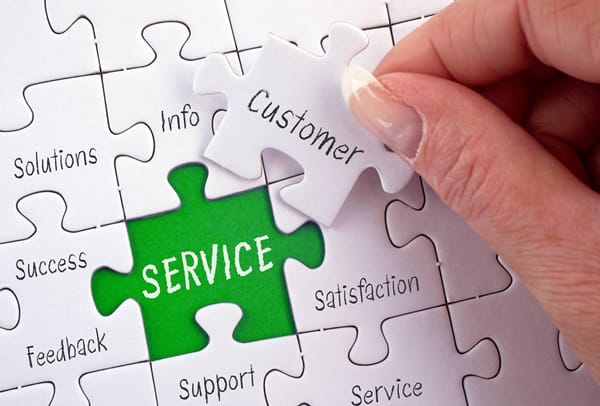Customer service is the assistance that is provided to customers in preparation for, during, and after the customer comes into contact with the purchased goods or services. This includes the ability to address issues, answer questions, and offer the support needed for a good customer experience. Customer service in today’s business environment has matured into a powerful business tool that is critical for loyalty building and growth.
Today’s customers are interactive, customised, and driven by technology. Companies now use multiple channels—phone, email, chat, and social media—to connect with customers. This omnichannel approach ensures consistent and seamless support, no matter the platform.
AI in customer service is transforming the way businesses handle these interactions. By automating routine tasks and providing personalised responses, AI helps companies deliver efficient and effective support, enhancing customer satisfaction.
What is customer service?
Customer service means responding to customer needs by providing professional, competent, and effective support before, during, and after the purchase. It is about searching, solving, and satisfying customer questions and issues.
Good customer service is fundamental to keeping customers happy, addressing their concerns, and building loyalty. Happy customers turn into brand evangelists, helping companies to grow, through positive word-of-mouth and repeat purchases. Ultimately, customer service is about meeting the needs and desires of customers to enhance their overall experience.
Why is customer service important?
Customer service has a direct influence on satisfaction, loyalty, and the image of a company. Superlative customer service builds a business’s customer base in the long term, lowers churn, and increases customer life value (CLV). Here’s why customer service is essential:
1. Boosting customer retention
- Retaining existing customers is more cost-effective than acquiring new ones.
- Positive experiences encourage repeat business and foster loyalty.
2. Increasing Customer Lifetime Value (CLV)
- Satisfied customers are more likely to spend consistently and explore upselling opportunities.
- Strong relationships lead to higher overall value per customer.
3. Enhancing brand reputation
- Exceptional service generates positive referrals and reduces negative reviews.
- It builds a reliable and trustworthy brand identity.
4. Gathering valuable insights
- Direct feedback helps businesses identify pain points and emerging trends.
- Insights guide product development and marketing strategies.
5. Gaining competitive advantage
- Outstanding customer service serves as a unique selling point.
- It influences customer decision-making processes beyond product features.
6. Proactive problem-solving
- Anticipating and addressing issues prevents escalation and demonstrates commitment.
- Proactivity reduces churn and improves satisfaction.
7. Driving business growth
- A customer-focused approach aligns organisational values and enhances employee engagement.
- Loyal customers and positive experiences contribute to increased sales and growth.
By prioritising customer support and utilising tools like customer service software, businesses can create a cycle of satisfaction, loyalty, and growth, fostering mutually beneficial relationships.
Ways to provide excellent customer service
1. Be friendly and empathetic
- Always greet customers with a smile and be courteous.
- Show empathy, especially during stressful or contentious situations.
2. Respond and communicate promptly
- Timely responses build trust and show respect for customers’ time.
- Aim to respond to inquiries within 24 hours.
3. Know your product or service
- Be well-versed in your offerings to provide accurate information and resolve issues efficiently.
- Highlight benefits and troubleshoot effectively.
4. Listen to your customers
- Active listening helps you understand customer needs and identify improvement areas.
- Sometimes, customers simply want to feel heard.
5. Say thank you
- Expressing gratitude leaves a lasting impression.
- Consider personalised gestures like handwritten notes, free samples, or special discounts.
6. Get to know your customers
- Build personalised relationships by understanding customer preferences and habits.
- Use tools like social media insights, surveys, and direct interactions.
7. Ask for feedback
- Inviting feedback shows customers that their opinions matter.
- Use surveys, questionnaires, and direct conversations to gather insights.
8. Use feedback to improve
- Regularly review customer feedback to identify areas for improvement.
- Implement changes based on suggestions to enhance service quality.
9. Focus on relationships
- Show genuine care for customers by offering personalised experiences and remembering past interactions.
- Strengthen relationships by anticipating needs and exceeding expectations.
10. Keep your promises
- Honor commitments to build trust and credibility.
- If a mistake occurs, offer solutions to rebuild confidence.
11. Follow up with customers
- Checking in after a purchase shows care and keeps your brand top-of-mind.
- Reconnecting with inactive customers can reignite interest and encourage repeat business.
Conclusion
Customer service is far more than a support function; it is the very heart and soul of business success. With an emphasis on preemptive, customised, and high-level services, companies can achieve loyalty, trust, and scale-up. From listening to customers and keeping promises to leveraging feedback and strengthening relationships, excellent customer service creates lasting value for both businesses and their customers.






Leave a Comment